Picture this: you’re avoiding your favorite foods, covering your mouth when you laugh, and feeling self-conscious about gaps in your smile. You’ve heard about dental implants, but the thought of major surgery and months of recovery makes you hesitate. What if I told you there’s a gentler alternative that could restore your confidence in just one visit? Mini dental implants might be the life-changing solution you’ve been searching for.
Key Takeaways
- Mini dental implants are smaller titanium posts (less than 3mm diameter) that can often be placed in a single appointment with minimal discomfort
- They’re ideal for stabilizing dentures and replacing small teeth, especially when bone density is limited
- The procedure is less invasive than traditional implants, with faster healing times and lower costs
- Success rates are excellent when properly selected for the right candidates
- Not everyone qualifies – your dentist will evaluate your specific situation to determine the best treatment option
Understanding Mini Dental Implants: The Basics
What are mini dental implants exactly? Mini dental implants (MDIs) are titanium posts that are significantly smaller than traditional dental implants, typically measuring less than 3 millimeters in diameter. While conventional implants can be 4-6mm wide, these compact alternatives offer a less invasive solution for tooth replacement and denture stabilization.
Think of mini dental implants as the “minimally invasive cousin” of traditional implants. They serve the same fundamental purpose—replacing tooth roots—but with a gentler approach that often appeals to patients who want to avoid extensive surgery.
How Mini Dental Implants Differ from Traditional Implants
The differences go beyond just size. Here’s what sets mini dental implants apart:
Size and Design:
- Diameter: Less than 3mm vs. 4-6mm for traditional implants
- Length: Typically 10-15mm long
- Design: One-piece construction vs. multi-piece traditional implants
Placement Process:
- Surgery: Minimally invasive, often flapless procedure
- Healing time: Immediate loading possible vs. 3-6 months for traditional
- Anesthesia: Usually requires only local anesthesia
Cost Considerations:
- Initial investment: Generally 40-60% less expensive than traditional implants
- Treatment time: Shorter, meaning fewer appointments and less time off work
The Mini Dental Implant Procedure: What to Expect
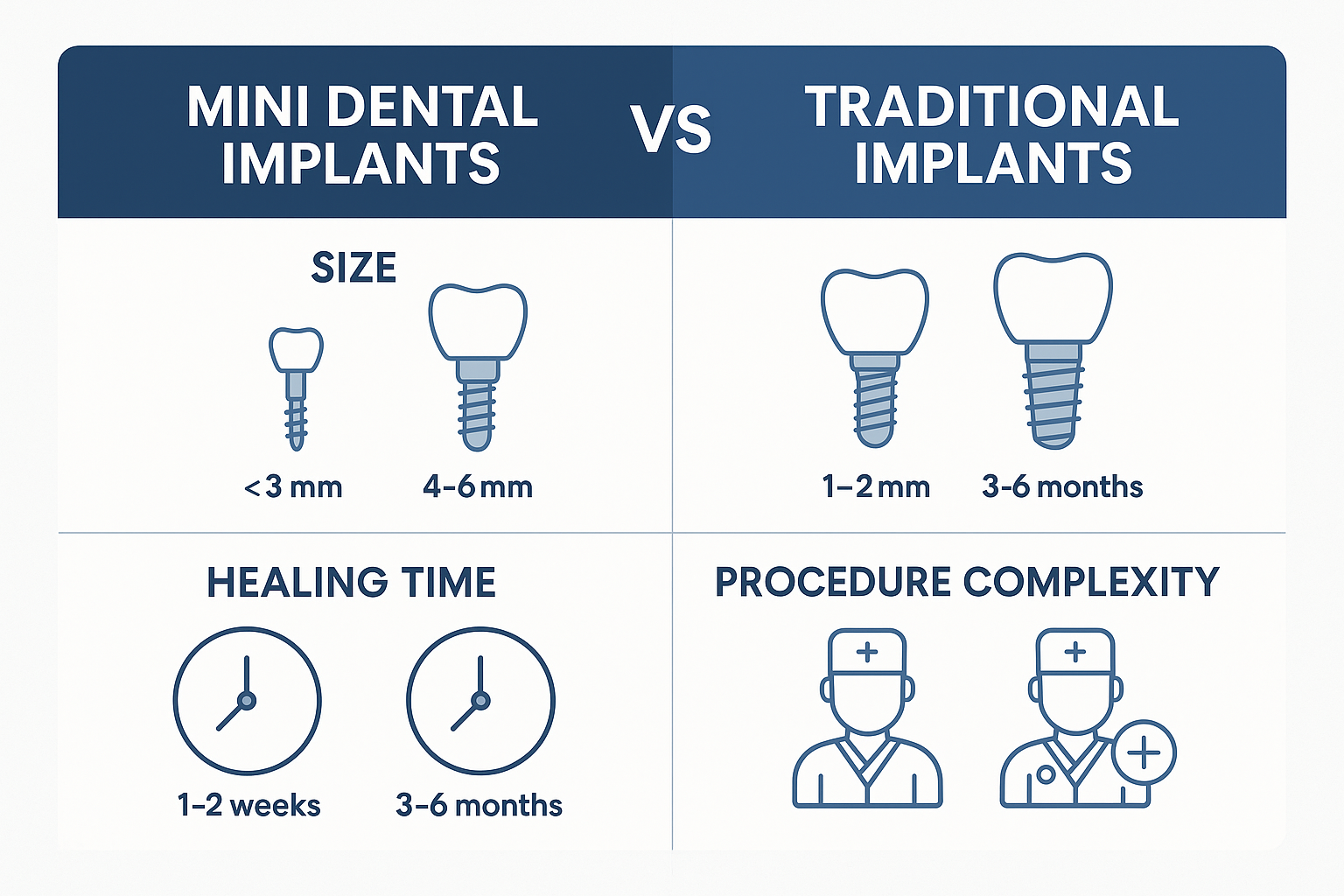
Initial Consultation and Planning
Your journey begins with a comprehensive evaluation. During this visit, your dentist will:
- Examine your oral health and bone density using X-rays or 3D imaging
- Discuss your goals and expectations for treatment
- Review your medical history to ensure you’re a good candidate
- Create a personalized treatment plan tailored to your needs
This consultation is crucial because not everyone is a candidate for mini dental implants. Your dentist needs to ensure you have adequate bone structure and healthy gums for successful placement.
The Placement Process
Here’s what makes mini dental implants so appealing—the actual procedure is remarkably straightforward:
Step 1: Preparation
- Local anesthesia is administered to ensure your comfort
- The treatment area is carefully cleaned and prepared
Step 2: Placement
- A small pilot hole is created in the jawbone
- The mini implant is gently screwed into place
- No sutures are typically required due to the minimally invasive approach
Step 3: Immediate Function
- In many cases, you can have your prosthetic attached the same day
- Your new teeth or stabilized dentures are ready to use immediately
The entire process often takes just 1-2 hours, depending on how many implants you need.
Who Benefits Most from Mini Dental Implants?
Ideal Candidates
Mini dental implants work exceptionally well for specific situations:
Denture Wearers 🦷 If you’re struggling with loose, uncomfortable dentures, mini dental implants can be life-changing. They provide the stability you need to eat, speak, and smile with confidence.
Patients with Limited Bone Density Traditional implants often require bone grafting procedures when bone density is insufficient. Mini dental implants can frequently be placed in areas where conventional implants wouldn’t be possible.
Those Seeking Quick Results If you need a faster solution due to work commitments, special events, or personal preferences, the immediate loading capability of mini dental implants is invaluable.
Budget-Conscious Patients The lower cost and reduced treatment time make mini dental implants accessible to more people seeking tooth replacement solutions.
When Mini Implants May Not Be Right
Heavy Chewing Forces If you’re replacing large molars that endure significant chewing pressure, traditional implants might be more appropriate due to their larger size and strength.
Single Tooth Replacement in High-Stress Areas For replacing individual teeth in areas that experience heavy bite forces, the smaller diameter of mini implants may not provide adequate long-term stability.
Severe Bone Loss While mini implants require less bone than traditional implants, you still need sufficient bone structure for successful placement.
Comparing Your Options: Mini vs. Traditional Dental Implants
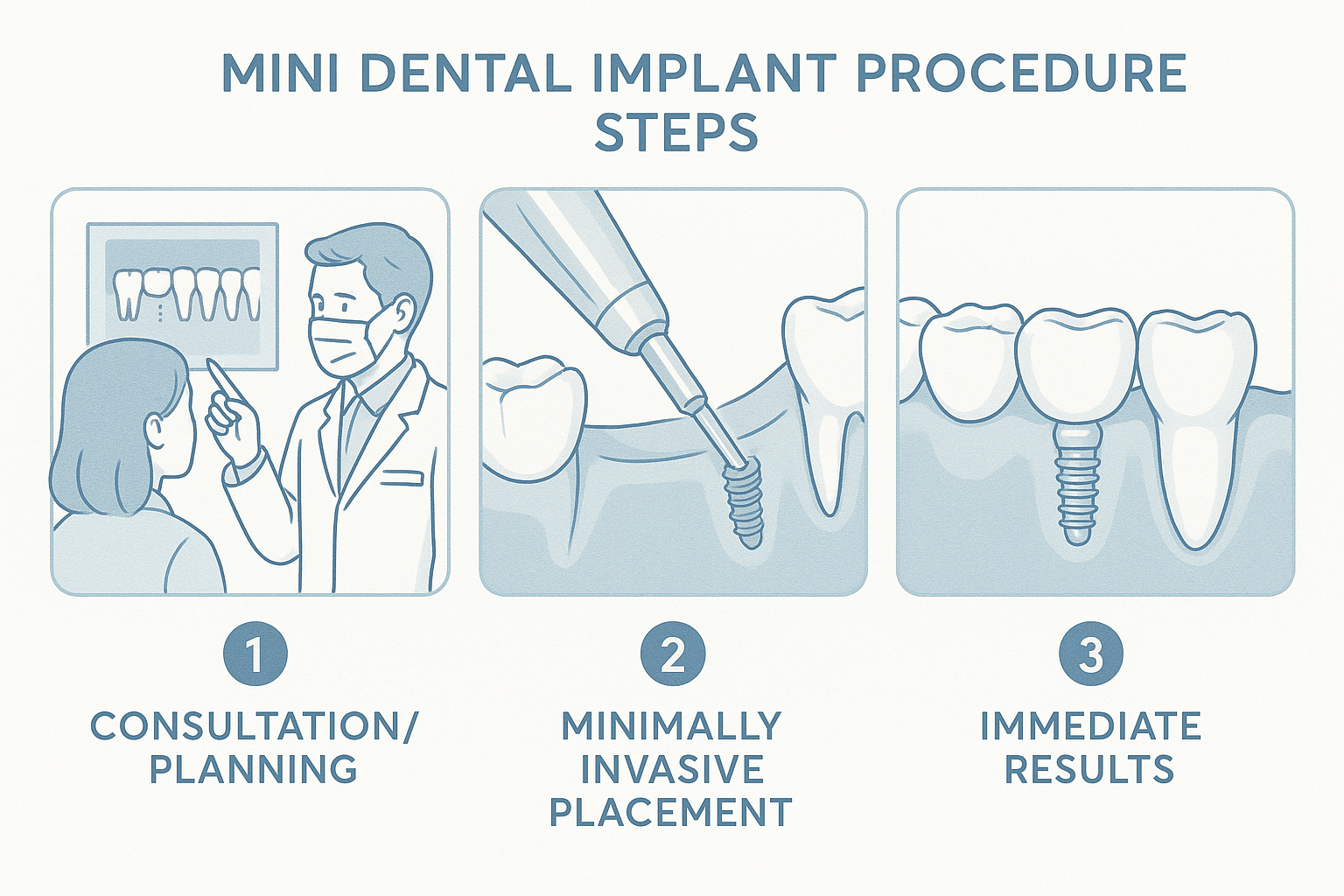
Mini vs Traditional Dental Implants
Compare your options to make the best decision for your smile
Mini Dental Implants
- Less invasive procedure
- Faster healing time
- Lower cost
- Same-day results possible
- Minimal discomfort
- Not suitable for all locations
- Less strength for heavy chewing
- May not last as long
Traditional Dental Implants
- Maximum strength and durability
- Suitable for all tooth positions
- Longer track record
- Can support larger restorations
- Highest success rates
- More invasive surgery
- Longer healing period
- Higher cost
- May require bone grafting
| Factor | Mini Dental Implants | Traditional Implants |
|---|---|---|
| Diameter | Less than 3mm | 4-6mm |
| Surgery Type | Minimally invasive | More extensive |
| Healing Time | 1-2 weeks | 3-6 months |
| Bone Requirements | Minimal | Substantial |
| Success Rate | 85-95% | 95-98% |
| Best For | Denture stabilization, small teeth | All tooth replacement needs |
Mini Implant Investment
- $500-$1,500 per implant
- Lower total treatment cost
- Fewer appointments needed
- Less time off work
- May be covered by insurance
Traditional Implant Investment
- $3,000-$5,000 per implant
- Long-term value
- Lifetime solution potential
- Higher insurance coverage
- Higher upfront cost
- Additional procedures may be needed
- More time investment
Benefits of Choosing Mini Dental Implants
Immediate Lifestyle Improvements
Eat Your Favorite Foods Again 🍎 One of the most significant benefits patients experience is the ability to enjoy foods they’ve been avoiding. Whether it’s biting into a crisp apple or savoring a perfectly grilled steak, mini dental implants can restore your confidence at mealtime.
Speak Clearly and Confidently Loose dentures can cause slurring, clicking sounds, or the embarrassing fear of your teeth slipping while talking. Mini dental implants eliminate these concerns, allowing you to speak naturally and confidently in any situation.
Smile Without Hesitation There’s something transformative about being able to smile freely. When you’re not worried about gaps, loose teeth, or uncomfortable dentures, your whole demeanor changes. You’ll find yourself more outgoing and confident in social situations.
Long-term Health Benefits
Preserve Jawbone Structure Like traditional implants, mini dental implants help preserve your jawbone by providing the stimulation it needs. This prevents the facial collapse that often occurs with prolonged tooth loss.
Maintain Oral Health Unlike bridges that require grinding down healthy adjacent teeth, mini dental implants are independent restorations that help maintain your overall oral health.
Reduce Gum Irritation If you’ve been dealing with sore spots and irritation from ill-fitting dentures, mini dental implants provide a stable foundation that eliminates these painful pressure points.
Understanding the Investment: Costs and Insurance Coverage

What Affects the Cost?
Several factors influence the total investment for mini dental implants:
Number of Implants Needed
- Single tooth replacement: 1 implant
- Denture stabilization: Typically 4-6 implants
- Full arch replacement: 6-8 implants per arch
Geographic Location Costs vary significantly across different regions. Dallas dental implant costs tend to be competitive compared to major metropolitan areas.
Additional Procedures While mini dental implants often don’t require bone grafting, some patients may need:
- Tooth extractions
- Gum disease treatment
- Minor bone preparation
Insurance and Medicare Considerations
Many patients wonder about insurance coverage for mini dental implants. Here’s what you need to know:
Medicare Coverage Medicare typically doesn’t cover dental implants, including mini dental implants, as they’re considered dental rather than medical procedures.
Medicaid Options Medicaid coverage for dental implants varies by state and is generally limited to emergency situations.
Private Insurance Delta Dental and other private insurers may provide partial coverage, especially when implants are deemed medically necessary.
Medical Insurance Possibilities In rare cases, medical insurance might cover dental implants when they’re required due to accident, trauma, or certain medical conditions.
Recovery and Aftercare: What to Expect
The First Few Days
Immediate Post-Procedure Care:
- Minimal discomfort: Most patients report only mild soreness
- Diet modifications: Stick to soft foods for the first few days
- Oral hygiene: Gentle brushing and prescribed mouth rinse
- Activity level: Most people return to normal activities within 24-48 hours
Pain Management: Unlike traditional implant surgery, mini dental implants typically require only over-the-counter pain medication. Many patients are surprised by how comfortable they feel after the procedure.
Long-term Success Strategies
Maintain Excellent Oral Hygiene 🦷
- Brush twice daily with a soft-bristled toothbrush
- Use antibacterial mouthwash as recommended
- Floss carefully around implant areas
- Consider a water flosser for thorough cleaning
Regular Dental Visits
- Schedule checkups every 6 months
- Professional cleanings help maintain implant health
- Early detection of any issues ensures long-term success
Lifestyle Considerations
- Avoid smoking, which can compromise healing
- Limit excessive alcohol consumption
- Maintain a balanced diet rich in nutrients that support oral health
Success Rates and Longevity
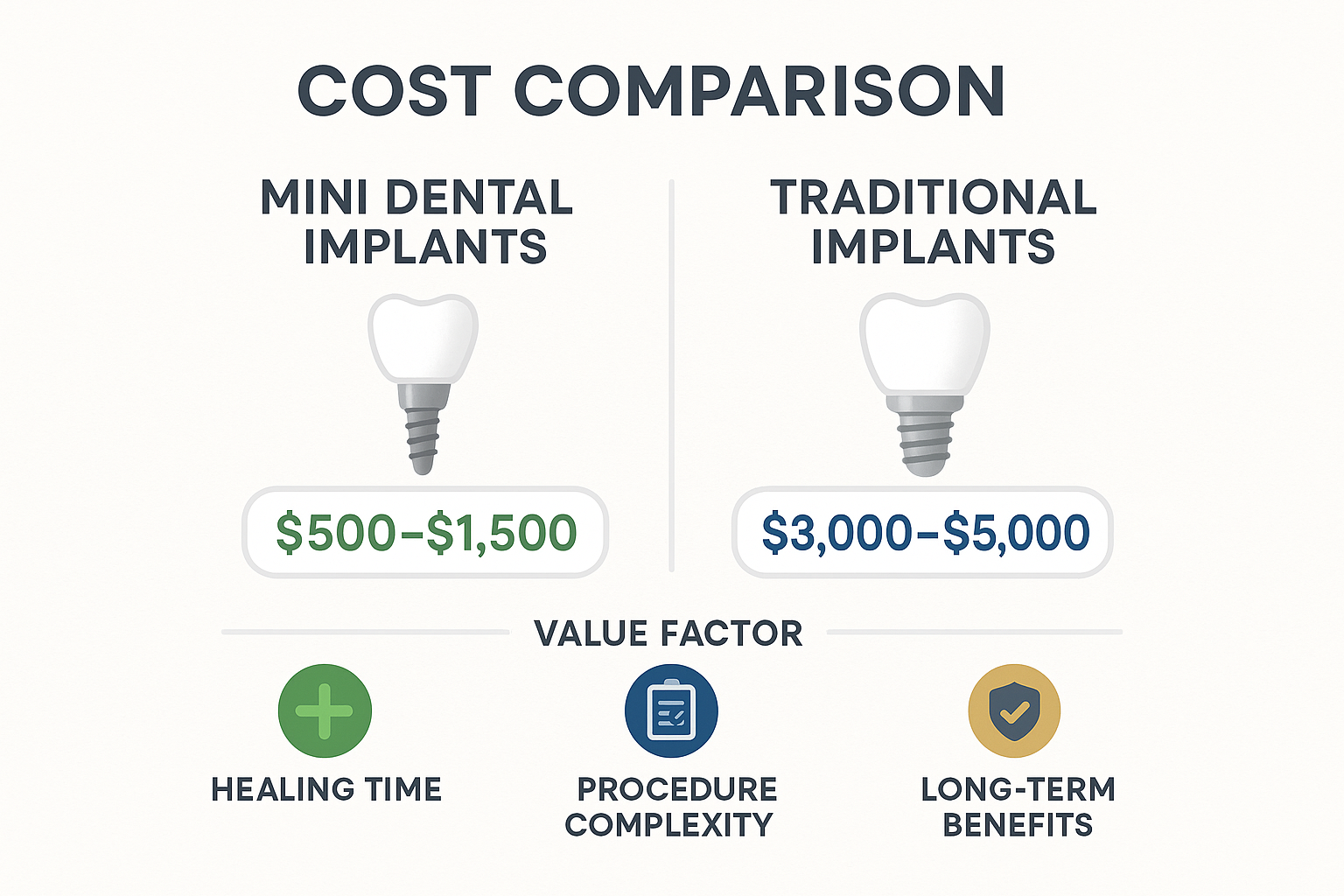
What the Research Shows
Mini dental implants have demonstrated excellent success rates when properly selected and placed:
Short-term Success (1-2 years): 95-98% Medium-term Success (3-5 years): 90-95% Long-term Success (5+ years): 85-92%
These rates are particularly impressive considering that mini dental implants are often used in challenging situations where traditional implants might not be feasible.
Factors That Influence Success
Patient Factors:
- Overall health and healing capacity
- Oral hygiene habits
- Smoking status
- Bone quality and quantity
Technical Factors:
- Proper case selection
- Surgical technique
- Implant quality and design
- Post-operative care compliance
Alternative Treatment Options
When Mini Implants Aren’t Right
If mini dental implants aren’t suitable for your situation, several alternatives exist:
Traditional Dental Implants For patients with adequate bone structure and no time constraints, traditional dental implants offer maximum strength and longevity.
All-on-4 Treatment All-on-4 dental implants provide full arch replacement using four strategically placed traditional implants.
Removable Options
- Partial or complete dentures
- Implant-supported removable prosthetics
- Flexible partial dentures
Making the Right Choice
The decision between mini dental implants and other options should be based on:
- Your specific anatomy and bone structure
- Lifestyle requirements and expectations
- Budget considerations and timeline
- Long-term goals for your oral health
Finding the Right Provider in Dallas
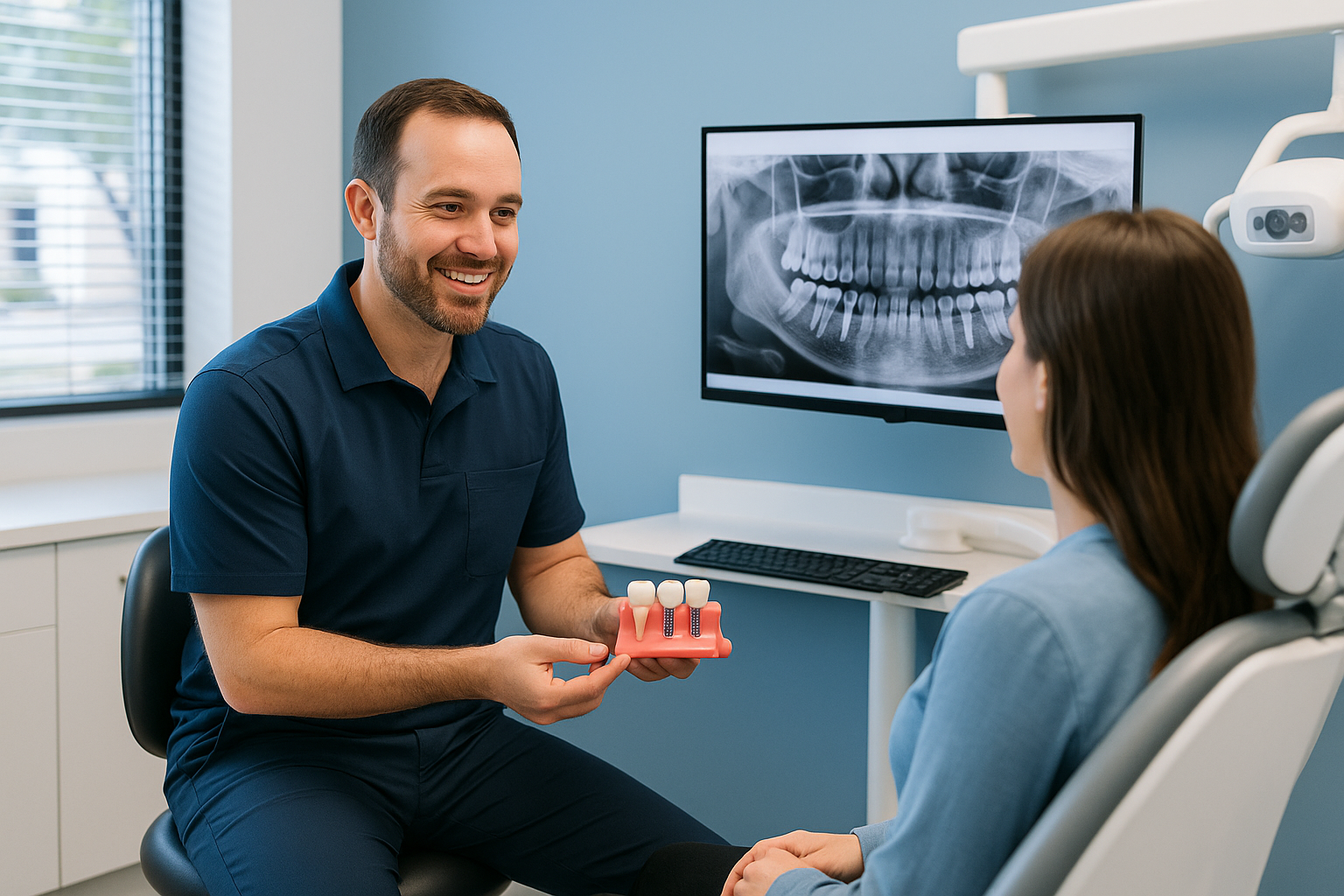
What to Look for in a Mini Dental Implant Specialist
Experience and Training:
- Specific training in mini dental implant placement
- Years of experience with the procedure
- Continuing education in implant dentistry
Technology and Techniques:
- 3D imaging capabilities for precise planning
- Modern sterilization and safety protocols
- Up-to-date equipment and materials
Patient-Centered Approach:
- Clear communication about treatment options
- Transparent pricing and financing options
- Comprehensive aftercare support
Questions to Ask During Your Consultation
- “How many mini dental implant procedures have you performed?”
- “What is your success rate with mini implants?”
- “Am I a good candidate, or would traditional implants be better for me?”
- “What does the total treatment cost include?”
- “What kind of warranty or guarantee do you provide?”
Choosing the right dental implant provider in Dallas can make all the difference in your treatment experience and long-term success.
Real Patient Experiences and Outcomes
Sarah’s Story: Denture Freedom at 68
Sarah had struggled with loose lower dentures for years. Simple activities like eating in public or laughing with friends had become sources of anxiety. After receiving four mini dental implants to stabilize her lower denture, she described the experience as “life-changing.”
“I went from avoiding social dinners to being the first to suggest trying new restaurants. The procedure was so much easier than I expected, and I felt confident eating that same evening.”
Michael’s Journey: Quick Solution for a Busy Executive
As a traveling executive, Michael needed a fast solution for a missing front tooth. Traditional implants would have required months of healing, but a mini dental implant allowed him to maintain his demanding travel schedule.
“I had the implant placed on Friday and was in an important client presentation on Monday. No one could tell I’d had any dental work done.”
The Future of Mini Dental Implants
Advancing Technology
The field of mini dental implants continues to evolve with exciting developments:
Improved Materials:
- Enhanced titanium alloys for better integration
- Surface treatments that promote faster healing
- Antimicrobial coatings to reduce infection risk
Better Techniques:
- Computer-guided placement for increased precision
- Minimally invasive protocols
- Same-day loading protocols
Expanded Applications:
- New designs for different clinical situations
- Improved retention mechanisms
- Better aesthetic outcomes
Growing Acceptance
As more dentists gain experience with mini dental implants and long-term studies demonstrate their effectiveness, acceptance continues to grow within the dental community. This increased adoption means better training, improved techniques, and more options for patients.
Conclusion: Is a Mini Dental Implant Right for You?
Mini dental implants represent a remarkable advancement in dental care, offering a gentler path to restored confidence and function. They’re particularly valuable for patients who want to avoid extensive surgery, need faster results, or have budget constraints that make traditional implants challenging.
The key to success lies in proper case selection. Not everyone is a candidate for mini dental implants, but for those who are, the results can be truly transformative. The combination of minimal discomfort, rapid healing, and immediate function makes them an attractive option for many patients.
Your Next Steps
If you’re considering mini dental implants, here’s what I recommend:
- Schedule a comprehensive consultation with an experienced implant dentist
- Discuss your goals and concerns openly during your appointment
- Ask about all your options to ensure you’re making the best choice
- Consider the long-term value of investing in your oral health and quality of life
Remember, every smile is unique, and what works best for one person may not be ideal for another. The most important thing is finding a solution that meets your specific needs, lifestyle, and goals.
Your journey to a confident, functional smile doesn’t have to involve extensive surgery or months of recovery. Mini dental implants might be the gentle, effective solution that helps you rediscover the joy of eating, speaking, and smiling without hesitation.
Ready to explore whether mini dental implants are right for you? Contact our Dallas dental implant specialists today to schedule your personalized consultation. Your new smile is waiting, and it might be closer than you think.

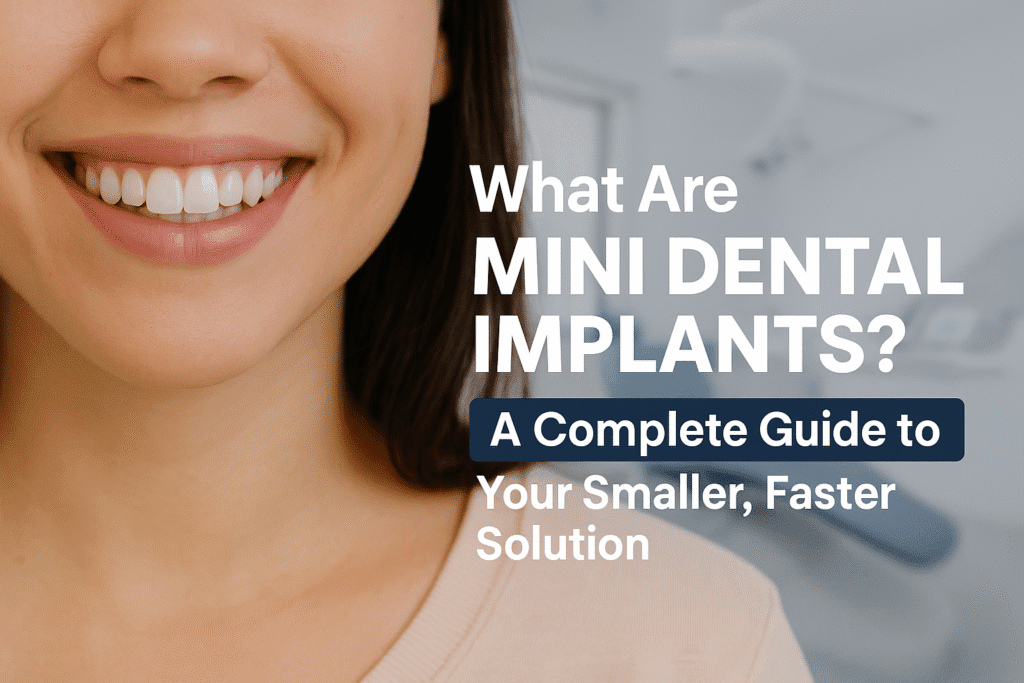
Leave a Reply
Share your thoughts or ask a question about dental implants. Your email address will not be published.